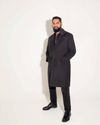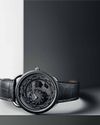
Last March, a cruise ship carrying 2,650 passengers was allowed to dock in Sydney, Australia. The country had around 250 cases of COVID in the days prior to the Ruby Princess’s arrival and the nation was alarmed by the mounting case numbers overseas. Nevertheless, all passengers were allowed to disembark and to travel on to other parts of the country, including 110 passengers with flu-like symptoms. Within five weeks 662 passengers had tested positive for the virus, seeding COVID through the community.
As the virus took hold and lockdown orders snapped into place, all I could think was, why would anyone ever go on a cruise?
Cruises are terrible. They are gaudy, tacky, gauche. They take their aesthetic cues from two of the more objectionable built environments on land: casinos and malls. Terrible things happen on cruises. Hedonistic guests indulge in debauched, bacchanalian behaviour. Crews labour under conditions resembling indentured servitude. Gastrointestinal illness is rife. It’s a bad time. Have I ever been on a cruise? No, but like so many things I have strong opinions about, I’ve seen enough to make up my mind.
When it became apparent that COVID would shut down the cruise industry for the foreseeable future, my reaction was twofold: this should never have been a thing in the first place and nothing of value has been lost. It was with this same smug, self-righteous certitude that I approached the Me Too revelations beginning in 2017:
Dustin Hoffman? Mediocrity on a stick.
Michael Jackson? If he’s not the most overrated star in popular music, then I don’t know who is.
This story is from the January 2021 edition of Esquire Singapore.
Start your 7-day Magzter GOLD free trial to access thousands of curated premium stories, and 9,000+ magazines and newspapers.
Already a subscriber ? Sign In
This story is from the January 2021 edition of Esquire Singapore.
Start your 7-day Magzter GOLD free trial to access thousands of curated premium stories, and 9,000+ magazines and newspapers.
Already a subscriber? Sign In

AN ELECTRIC FUTURE
Polestar, the minimalist electric Swedish car brand, turns the voltage up on its competition.

NEXT UP....ZARAN VACHHA
As Co-founder of the events and talent agency Collective Minds and Managing Director of the Mandala Masters, Zaran Vachha is definitely not new to the culture scene, but he's certainly shaping what comes next.

WHAT I'VE LEARNED...
I DON’T WEAR SOCKS except in January.

The Body Is a Language
A bad handshake is such a turnoff; we feel irked when someone rolls their eyes at us; we can't stop pacing when we're nervous-ever wondered how certain body language has the power to change how we feel instantly? We explore why.

LIKE NO OTHER
With its horological triumphs, Hermès has truly come into its own as a watchmaking maison. In this exclusive interview with Esquire Singapore, CEO of Hermès Horloger, Laurent Dordet sheds some light on his timepieces' rising stardom and the importance of being different.

PAST PRESENT FUTURE
Simplicity and style go hand in hand with the Patek Philippe Calatrava.

JUST IN CASE
Rimowa marks the official return of its cult and insider-favourite Original Pilot Case with a breathtaking film by Director Albert Moya.

LOW-KEY LUSTRE
Looking for a subtle way to wear jewellery? Black rhodium is your new go-to.

FIVE MINUTES WITH...Yihao Shi, Co-founder and Managing Director of HoteLux.
HoteLux is a membership-based luxury hotel reservation app with instant booking confirmation.

MUSE
An ode to the sexy, brilliant and talented women who inspire us. This month, meet beauty influencer and entrepreneur Sahur Saleim.